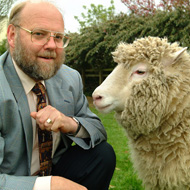
Fans celebrate 20-year anniversary of birth
Scientists involved in the original creation of Dolly will join members of the public to mark the twentieth anniversary of her birth. Infamous in the scientific breakthrough she embodied, fans will be invited to reflect on her life and share their hopes for what associated research may achieve.
Work continues at the Roslin Institute in Midlothian, where Dolly was produced, to develop gene-editing technologies to alter DNA to improve the health and welfare of farmed animals.
Professor Sir Ian Wilmut, original research team leader, said: “When Dolly was born we knew that we had achieved something extraordinary. But I don’t think any of us would have predicted the level of public interest in our research.”
Dolly was the first mammal to be cloned from an adult cell, in a process that involved replacing the nucleus of an embryo with a nucleus from a cell from another animal. The resulting birth generated a media frenzy regarding the ethics of cloning and its possibilities.
However the process of extracting a nucleus from an adult cell and the acceptance of it by an embryonic cell paved the way for genetic modification of animals and ultimately human stem-cell research possibilities.
Dolly will be displayed from Friday 8 July at the National Museum of Scotland in Edinburgh as part of a ten-gallery project devoted to science, technology design and fashion.
Image © Roslin Institute



 The Federation of Independent Veterinary Practices (FIVP) has announced a third season of its podcast, Practice Matters.
The Federation of Independent Veterinary Practices (FIVP) has announced a third season of its podcast, Practice Matters.